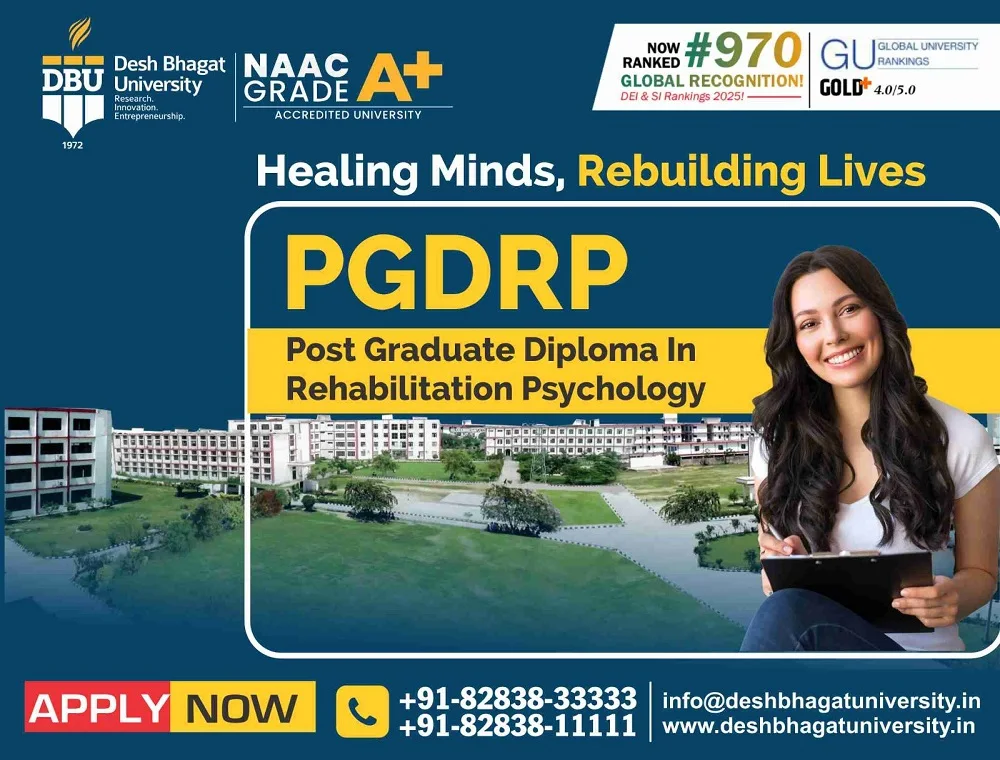PGDRP Course: Full Form, Fees, Eligibility and Admission
September 30, 2025 2025-12-16 11:20PGDRP Course: Full Form, Fees, Eligibility and Admission

PGDRP Course: Full Form, Fees, Eligibility and Admission
PGDRP stands for Post Graduate Diploma in Rehabilitation Psychology. It is a postgraduate diploma course. The PGDRP course teaches you how to help people with disabilities or mental challenges recover, regain their abilities, and live a better life.
In simple words, PGDRP trains you in psychology, therapy, and rehabilitation methods. You learn how to support people who have physical or mental difficulties. This work is very important today because many people need help to regain their independence, mental strength, and daily functioning.
Desh Bhagat University offers this PGDRP programme under its Education – Diploma Programmes section.
In this article, we will explore:
- PGDRP full form
- PGDRP course details
- Eligibility and duration
- Seats, approvals & recognition
- PGDRP course fees (as per available data)
- Course content & skills gained
- Career paths after completing PGDRP
- Challenges and tips for success
- Why choose this PGDRP at Desh Bhagat University
PGDRP Full Form & Key Meaning
PGDRP stands for Post Graduate Diploma in Rehabilitation Psychology.
- Post Graduate Diploma means it is a diploma course taken after graduation (i.e., after earning a Bachelor’s degree).
- Rehabilitation Psychology is the branch of psychology that works with individuals who have disabilities, injuries, or psychological challenges to help them recover, adapt, and live better.
So, the PGDRP course is meant to prepare students to become professionals who can apply psychological principles and rehabilitation techniques in real life.
Eligibility, Duration & Seat Intake
Eligibility Criteria
To enter the PGDRP course at Desh Bhagat University, you must meet the following requirements:
- You must have a Bachelor’s degree in regular mode with courses in General Psychology in all three years.
- Or, you may have a Master’s degree in any branch of Psychology, either via regular mode or distance mode.
- Or, a Master’s degree in Counseling Psychology (regular or distance mode).
- You must score a minimum of 55% aggregate marks. For SC / ST / OBC categories (in Punjab, for example), the minimum may be 50%.
- The qualification must be from a UGC-recognized university.
These criteria ensure that students already have a good foundation in psychology before joining rehabilitation training.
Duration of PGDRP Course
The PGDRP course duration is one year.
This means the course is designed to be completed in one academic year, with all theory, practicals, and training fitting into that period.
Seat Intake & Approvals
- Desh Bhagat University offers limited seats for PGDRP.
- The PGDRP program at DBU is approved by RCI (Rehabilitation Council of India).
Having RCI approval is important because it ensures standards, quality, and recognition in the rehabilitation field.
PGDRP Course Fees
Desh Bhagat University offers the PGDRP course with affordable and student-friendly fees. The university aims to make quality education in rehabilitation psychology accessible to all serious learners. The fees are designed to cover the entire academic program, including classroom learning, practical training, and clinical exposure, ensuring students get complete value for their investment in education.
The PGDRP course fees include access to modern facilities, guidance from experienced faculty, and hands-on training in clinical and rehabilitation settings. The university periodically updates the curriculum and training resources to keep students well-prepared for real-world work in hospitals, rehabilitation centers, and counseling clinics.
DBU understands that fee transparency is important for students and their families. For exact fee details, payment schedules, and any scholarships or financial assistance, students are encouraged to contact the university directly or visit the campus. This helps ensure they receive accurate and up-to-date information before enrolling in the program.
Course Content, Skills & Learning Objectives
Desh Bhagat University offers a PGDRP course that teaches everything needed in rehabilitation psychology. The course includes:
- Basic psychological theories and counseling skills
- Ways to help people recover, including physical, mental, and social support
- How to test and assess clients
- How to plan therapy and give support
- Practical training or internships in places where rehabilitation is needed
- Rules, rights, and ethics for helping people with disabilities
- Special topics like behavior management and using assistive tools
The PGDRP course is part of the “Special Education & Training” department. Students learn how to assess clients, give therapy, plan rehabilitation, talk to clients and families, and follow ethical rules. They also get real-world experience through supervised fieldwork and practical training. This prepares them to work in hospitals, rehabilitation centers, schools, and NGOs.
Career Options after PGDRP
Completing the PGDRP course opens various career pathways in rehabilitation, psychology, and support services. Some possible roles:
- Rehabilitation Psychologist / Counsellor: Work in hospitals, rehab centres, NGOs, helping people with physical or psychological disabilities.
- Special Education Support: Assist in schools or institutions for people with special needs, providing counselling and rehabilitation.
- Behavioural Therapist: Focus on behaviour change, adaptation, and cognitive therapy.
- Rehabilitation Coordinator / Manager: Oversee rehab programs, manage teams and resources.
- Researcher: Conduct studies; publish papers on rehabilitation psychology topics.
- Consultant / Trainer: Train staff in institutions, NGOs, or government in rehabilitation techniques.
- Government / Social Welfare Jobs: Work in governmental programs or schemes for disability, rehabilitation, or welfare.
Because the PGDRP is approved by RCI, the diploma carries credibility in the field.
These roles help society. You will not just get a job but contribute to healing, inclusion, and improving lives.
Benefits of PGDRP & Why It Matters
- You learn special knowledge in rehabilitation psychology, not just general psychology.
- You can help vulnerable people, such as those with disabilities, trauma, or long-term health problems.
- Your skills are in demand because more people need rehabilitation and mental health support today.
- With this diploma and experience, you can study further, like doing a Master’s or PhD in rehabilitation.
- The course is recognized by the Rehabilitation Council of India (RCI), which gives your work and skills official approval.
Choosing the PGDRP course is a good way to use your education to help others, have a rewarding career, and learn special skills.
Challenges & Tips to Succeed in PGDRP
Challenges you may face:
- The course is one year long and intensive, so managing your time well is important.
- Balancing classroom learning with practical training can be challenging.
- Working with people who have disabilities or mental health issues can be emotionally hard.
- Learning advanced assessment tools and therapy methods may take extra effort.
- Finding good field placements or internships may require being proactive and quick.
Tips to succeed:
- Stay organized: Plan your studies, assignments, and field work.
- Start field work early: Get practical experience in rehabilitation settings to use what you learn in class.
- Communicate well: Talk to clients, families, and other professionals with care and understanding.
- Read a lot: Use textbooks, research papers, and case studies to learn more about rehabilitation psychology.
- Practice assessment tools: Get hands-on experience with psychological tests and interview methods.
- Have a support system: Stay connected to mentors, classmates, and emotional support during tough times.
- Stay ethical: Respect client confidentiality, rights, and dignity at all times.
- Reflect and improve: After each assignment or client session, think about what went well and what can be better.
Why Choose the PGDRP at Desh Bhagat University
Desh Bhagat University’s PGDRP course has many strengths:
- The program is listed under the Education Diploma Programmes section.
- Eligibility and course structure are clearly explained in official documents.
- The course is approved by the Rehabilitation Council of India (RCI), ensuring quality education.
- DBU provides a structured program and resources like the prospectus with all program details.
- The course is part of the Department of Special Education & Training, showing it focuses on education and rehabilitation for people with special needs.
- The university offers admission support, counselling, and guidance for students.
These features make the PGDRP course at Desh Bhagat University a reliable and well-organized choice for students who want to specialize in rehabilitation psychology.

Sample Structure & Timeline for PGDRP Course
Below is a possible structure (not the actual syllabus, but an illustrative timeline):
| Period | Focus | Activities |
| Months 1–3 | Foundation & Theory | Counseling skills, intervention techniques, and assistive devices |
| Months 4–6 | Applied Methods | Counseling skills, intervention techniques, assistive devices |
| Months 7–9 | Field Work / Internship | Placement in rehabilitation centers or NGO settings |
| Months 10–12 | Project & Review | Final project or case study, presentation, wrap-up of learning |
During each phase, you will combine theory, practical tasks, and evaluations.
Conclusion
The PGDRP course (Post Graduate Diploma in Rehabilitation Psychology) at Desh Bhagat University is a one-year program designed for students who want to help people with disabilities or mental health challenges. The course teaches psychology theory, rehabilitation methods, practical training, and ethical practices.
The university offers this program with affordable and student-friendly fees. If you want to use your knowledge of psychology to help people recover, adapt, and live better lives, the PGDRP course at Desh Bhagat University is a valuable and practical choice.
FAQs
1. What is the full form of PGDRP?
The PGDRP full form is Post Graduate Diploma in Rehabilitation Psychology. It is a one-year diploma program that prepares students to work in the field of psychology, especially with people who need rehabilitation support. The course gives both theoretical knowledge and practical skills to help patients improve their lives.
2. What is the PGDRP course?
The PGDRP course is a professional program that focuses on rehabilitation psychology. It trains students to understand human behaviour, mental health issues, and recovery methods. The course also teaches how to support people with disabilities, emotional problems, or trauma. It combines classroom learning with practical training in real situations.
3. Who can apply for PGDRP?
Students who have a bachelor’s degree in psychology, a master’s degree in psychology, or a master’s degree in counselling psychology can apply. Candidates must have studied at a UGC-recognized university. They also need at least 55% marks, while reserved category candidates can apply with 50% marks in qualifying exams.
4. What is the duration of the PGDRP course?
The PGDRP course is for one year. It is taught in a yearly mode, which means all exams and assessments are conducted once a year. During this year, students attend classes, study theory, complete assignments, and also get practical training. This short but focused program builds good professional skills.
5. How many seats are available for PGDRP?
The PGDRP program has limited seats to ensure proper training and attention to every student. At Desh Bhagat University, only 20 seats are available every year. The small batch size helps teachers give personal guidance, and students also get better exposure during practical sessions and training activities in the course.
6. What is the eligibility for PGDRP?
Eligibility depends on your academic background. You must have either a bachelor’s degree with psychology as a subject in all three years, or a master’s degree in psychology, or a master’s in counselling psychology. The minimum marks required are 55%, and for SC, ST, or OBC candidates, it is 50%.
7. What is taught in the PGDRP course?
The course includes subjects related to rehabilitation psychology, assessment methods, counselling, therapy skills, and practical case studies. Students learn to work with people who have mental health needs or disabilities. They also get training in handling real-life situations, writing reports, and helping patients improve their emotional and social well-being.
8. What are the career options after PGDRP?
After completing PGDRP, students can work as rehabilitation psychologists, counselors, or mental health professionals. They can find jobs in hospitals, schools, rehabilitation centers, or research organizations. Some may also choose to study further and specialize more in psychology. This course opens many opportunities for a strong and respected career.
9. What are the PGDRP course fees?
The PGDRP course fees cover both theory classes and practical training to prepare students for their careers. For the latest fee details, exam charges, and other costs, you can contact the university or visit the campus.
10. Why should I choose PGDRP?
You should choose PGDRP if you are interested in psychology and want to help people live better lives. The program is short in duration but very powerful in impact. It gives you professional recognition, practical knowledge, and a chance to work in a respected field. It is a meaningful career choice.





